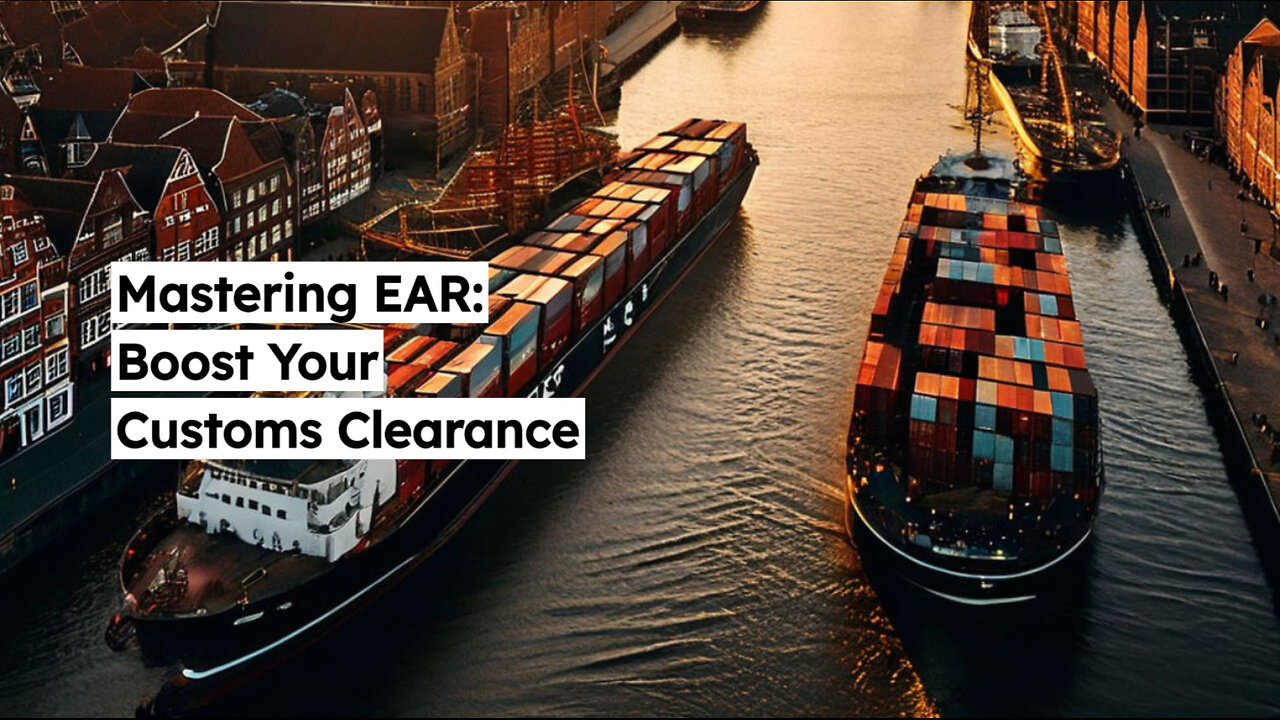Premium Only Content

Navigating Export Administration Regulations: How EAR Affects Customs Clearance
* e-Customs Clearing
* 714-855-3556
* info@eCustomsClearing.com
* https://ecustomsclearing.com
Export Administration Regulations (EAR) are a set of US Government regulations that govern the export and re-export of certain items, technologies, and software from the United States. These regulations are enforced by the Bureau of Industry and Security (BIS), and their goal is to protect US national security, foreign policy, and economic interests by controlling the export of potentially sensitive goods and technologies.
EAR has a significant impact on the customs clearance process. Customs brokers, as well as exporters and freight forwarders, must ensure compliance with EAR to avoid penalties, delays, and legal consequences. There are several key aspects to consider regarding how EAR affects customs clearance.
Firstly, exporters must accurately classify their goods based on the Commerce Control List (CCL), which identifies items subject to export controls. If an item requires an export license, exporters must obtain one from the BIS before shipping. Failure to obtain a required license can result in delays, penalties, and even export bans.
Secondly, exporters must conduct restricted parties screening to ensure they're not doing business with entities listed on any restricted or denied party lists. Engaging with a restricted party can result in severe consequences, so thorough screening is essential.
Additionally, EAR prohibits participation in boycotting activities against countries friendly to the United States. Exporters must comply with these anti-boycott regulations and report any requests or demands to participate in such activities.
Furthermore, compliance with EAR involves maintaining accurate and detailed records of export transactions, including documentation related to classification, licensing, shipping, and destination control. These records must be readily available for inspection by the authorities.
Non-compliance with EAR can lead to significant penalties, including fines, seizure of goods, loss of export privileges, and even criminal charges. Customs authorities cooperate closely with the BIS to enforce EAR provisions and ensure compliance.
In conclusion, understanding and complying with Export Administration Regulations (EAR) is crucial for customs brokers, exporters, and freight forwarders to facilitate the smooth clearance of goods. EAR impacts various aspects of the customs clearance process, including classification and licensing, restricted parties screening, anti-boycott compliance, record-keeping, and enforcement. Adhering to EAR requirements is essential to avoid delays, penalties, and legal consequences in international trade operations.
#usimportbond #isfcustomsbroker #uscustomsclearing #isfentry
Video Disclaimer Here: This educational video is not linked to any US government entity.
1:12 - EAR imposes requirements and restrictions on the export of goods, affecting the customs clearance process.
1:37 - Exporters must correctly classify their goods based on the Commerce Control List and obtain an export license when required. Failure to do so can result in penalties, delays, and export bans.
2:19 - EAR also prohibits participation in boycotting activities against friendly countries, requiring exporters to adhere to anti-boycott regulations.
2:59 - Non-compliance with EAR can lead to penalties such as fines, seizure of goods, loss of export privileges, and even criminal charges.
3:28 - Compliance with EAR involves various measures such as correct classification and licensing, restricted parties screening, anti-boycott compliance, record-keeping, and adherence to other regulatory requirements to avoid negative impacts on trade operations.
-
 3:21:11
3:21:11
Barry Cunningham
13 hours agoPRESIDENT TRUMP IS THE STORM! DEMOCRATS INITIATE A COUP! LIBNUTS LOSING IT! ARE YOU READY?
138K154 -
 26:56
26:56
MYLUNCHBREAK CHANNEL PAGE
20 hours agoUnder The Necropolis - Pt 6
117K35 -
 3:00:09
3:00:09
DLDAfterDark
6 hours ago $4.84 earnedDLD Live! Today's Leftist Extremists - Feat. Fattac Josh & Red Dawn Readiness
31.6K4 -
 1:53:47
1:53:47
Break The Cycle w/ Joshua Smith
1 day ago $1.30 earnedBreak The Cycle Ep. 246: The Return w/ Vinny Marshall
29.5K2 -
 53:09
53:09
Man in America
13 hours agoThe '3 White Killers' Making Americans Fat, Sick & DEAD w/ Food Chemist Stephen Talcott
43.6K12 -
 2:16:41
2:16:41
Tundra Tactical
9 hours ago $13.46 earnedThe Pew Pew Jew On Tundra Nation Live : The Worlds Okayest Gun Live Stream
86.6K6 -
 7:36
7:36
Colion Noir
12 hours agoDonald Trump Issues Executive Order To Protect The Second Amendment
93.7K63 -
 13:39
13:39
Exploring With Nug
18 hours ago $6.30 earnedCars Found Underwater While Searching Georgia Woman!
77.9K2 -
 56:50
56:50
IsaacButterfield
1 day ago $8.58 earnedSam Kerr Goes To Jail | Americas Worst Law | Teacher Of The Year
88.6K19 -
 6:14
6:14
Silver Dragons
1 day agoAmerican Silver Eagle Coins - Dealer Reveals Everything You NEED to Know
81.8K9